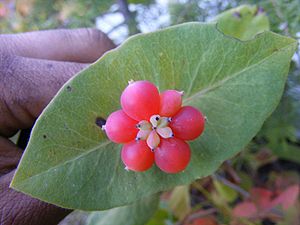Lonicera ciliosa
| Lonicera ciliosa | |
|---|---|

| |
| Scientific classification | |
| Kingdom: | Plantae |
| Clade: | Tracheophytes |
| Clade: | Angiosperms |
| Clade: | Eudicots |
| Clade: | Asterids |
| Order: | Dipsacales |
| Family: | Caprifoliaceae |
| Genus: | Lonicera |
| Species: | L. ciliosa
|
| Binomial name | |
| Lonicera ciliosa | |
Lonicera ciliosa, the orange honeysuckle or western trumpet honeysuckle is a honeysuckle native to forests of western North America. A deciduous shrub growing to 6 m (20 ft) tall with hollow twigs, the leaves are opposite, oval, 4–10 cm (1.6–3.9 in) long with the last pair on each twig merged to form a disk. The flowers are orange-yellow, 2–4 cm (0.79–1.57 in) long, with five lobes and trumpet shaped; they are produced in whorls above the disk-leaf on the ends of shoots. The fruit is a translucent orange-red berry less than 1 cm (0.39 in) diameter.[1][2]

Medicinal uses
[edit]During Lewis and Clark's expeditions beginning in 1804, Lonicera ciliosa was one of the many florae recorded.[3] The orange honeysuckle was used as cold medicine, a contraceptive, a sedative and even as a tuberculosis remedy.[4]
Edible uses
[edit]The fruits are edible[5] either raw or cooked, but are not a common food.[6]
References
[edit]- ^ "Lonicera ciliosa". Germplasm Resources Information Network. Agricultural Research Service, United States Department of Agriculture. Retrieved 21 January 2018.
- ^ U. of Washington Burke Museum: Lonicera ciliosa
- ^ "June 5, 1806". Discover Lewis & Clark. 5 June 1806. Retrieved 2023-05-28.
- ^ Heaton, Darrall; DerMarderosian, Ara (2004). "An Ethnobotanical and Medical Research Literature Update on the Plant Species Collected in the Lewis and Clark Expedition of 1803-1806". Bartonia (62): 63–93. ISSN 0198-7356. JSTOR 41610108.
- ^ Fagan, Damian (2019). Wildflowers of Oregon: A Field Guide to Over 400 Wildflowers, Trees, and Shrubs of the Coast, Cascades, and High Desert. Guilford, CT: FalconGuides. p. 227. ISBN 978-1-4930-3633-2. OCLC 1073035766.
- ^ Plants For A Future -- Lonicera ciliosa

